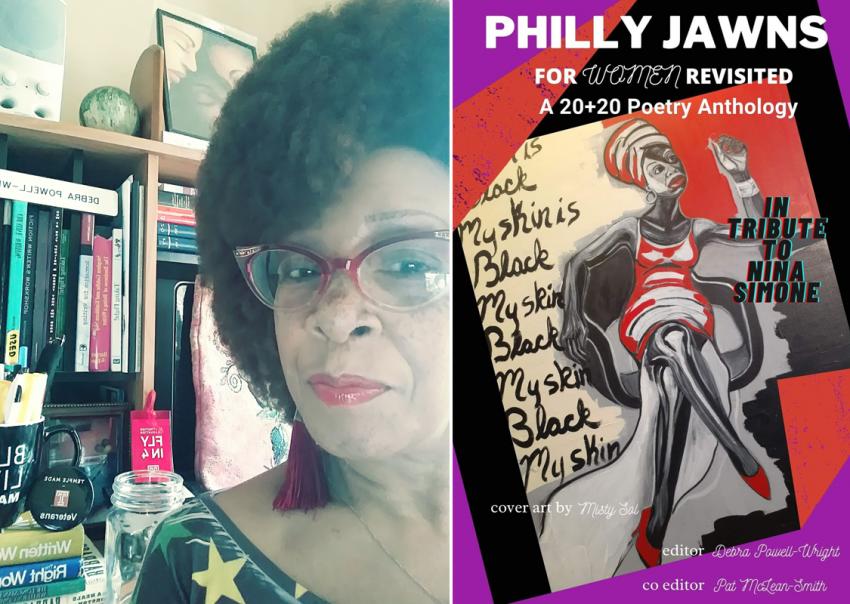Q&A with Debra Powell-Wright, Co-Editor of “Philly Jawns”

On Friday, March 26, Arcadia University will host the event Philly Jawns Speak: Mississippi Goddam Revisited 2021 in honor of Women’s History Month. This panel and discussion will focus on how art meets activism. Moderated by Director of Young Men’s Initiative at Philadelphia Futures Gabriel Bryant, it will bring together ten of the female poets and artists featured in Philly Jawns: For Women Revisited, a 20+20 poetry anthology in tribute to Nina Simone, a new book co-edited by Debra Powell-Wright and Pat McLean-Smith.
This event was sponsored by the Pan African Studies and the Black Alumni Association of Arcadia University.
Q: What can audiences expect from the event on March 26?
Debra Powell-Wright: This will be a reading, discussion and poetry performance from a collection of poetry called Philly Jawns: For Women Revisited, a 20+20 poetry anthology in tribute to Nina Simone. This particular reading will feature poets from two chapters: “Backlash Blues” and “I Put a Spell on You.” Gabriel Bryant works in the mental health and youth advocacy field for the City of Philadelphia and he does a lot of social justice work as well. He will be discussing with the poets, not only the actual poems that they have written in the categories, but their own work with social justice activism, particularly because it’s Women’s History Month and how that ties into their activism in terms of being women of color.
Q: So what does this collection mean to you personally?
DPW: Especially in 2020—I’m not even talking about the pandemic, but Breonna Taylor. That’s what it means to me. Malcolm X said it—Black women are the least respected people on the planet. I want all Black girls to be able to have a voice. It means, as it relates to Nina Simone, I just adore the sound of her voice and she’s unapologetic about being Black and a woman.
I read her biography, I Put a Spell on You, back in 2012 when I was putting together [my first Nina Simone] collection. What I didn’t know at the time was that she had suffered from mental illness later on in life, as did my mother. My mom passed in 2001. Once I read her biography, I just really felt a connection that was empathetic because you know toward the end of her life, her voice was not the same, and there were the behavior issues that she had exhibited. She feels very personal to me, her story—her life—and there’s interviews where she’s talked about just really suffering and being disappointed in how things turned out. So, [the book] also represents that it’s an opportunity to tell some of our truths and be listened to, because if you’re reading the book, you’re being listened to. That has not always happened, we’re not the dominant voice. It’s all of that, it’s really a human experience that we’re sharing. It means all of that to me.
Q: In talking about mental health with Nina Simone, is that one of the reasons that you’ve asked Bryant to be the moderator?
We’ve been doing one chapter at a time, so this event is unique—it’s going to have two and I wanted to have some guest entertainers. March 26 represents that week that Nina Simone met Dr. [Martin Luther King, Jr.] during the Selma to Montgomery March. She played on the stage and they said the stage was made out of coffins, and she sang “Mississippi Goddam.” The other March date is March 13, which is the day Breonna Taylor was killed. Some of these women are going to be showing up listening to their fellow sisters, and that wasn’t fair. So we doubled up for Black History Month, Women’s History Month, and poetry month in April.
Q: Can you tell me about this cover image?
DPW: I contacted Misty Sol, who actually drew this cover, she’s an artist and poet as well. This picture is actually the picture that I wanted, and I asked if she could do the cover. I had seen it online, black and white, of Nina Simone. So, she asked me what colors I wanted because typically you need three colors. I didn’t know and she said red. I said sure, but the next day, I remembered the poem that my step daughter wrote—in my stanza she says, “I love you the purplest.” So I called Misty back, and I said I need you to throw some purple in there. So, there’s smatterings of purple. The whole thing has been very organic.

